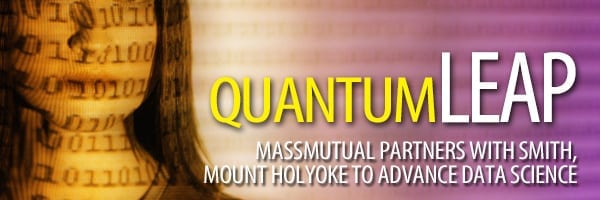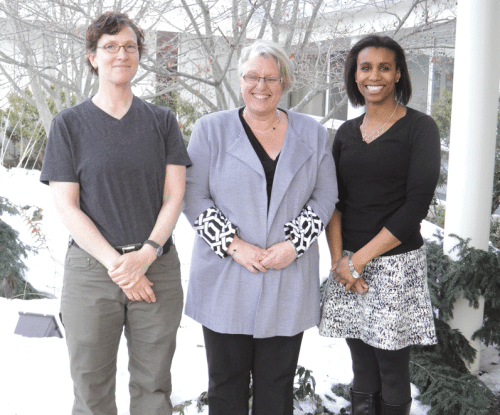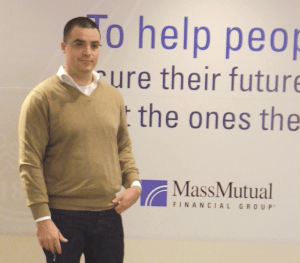
Quantum Leap
MassMutual Partners with Smith, Mount Holyoke to Advance Data Science
 Gareth Ross says a pipeline of data scientists, or people who possess skills related to the emerging field, is critical to the future of every company. But he also knows it’s difficult to find, attract, and retain qualified job candidates.
Gareth Ross says a pipeline of data scientists, or people who possess skills related to the emerging field, is critical to the future of every company. But he also knows it’s difficult to find, attract, and retain qualified job candidates.
“It’s a very, very specialized area. The analytics involved are very complex and require a doctorate in statistics, computer science, or both,” said Ross, MassMutual’s senior vice president of Data Analytics and Target Markets.
Indeed, studies show there are not enough qualified individuals to analyze, interpret, explain, and make use of the enormous amounts of data spawned by modern technology, which range from the online behavior of Facebook users to outcomes of medical procedures, to the purchasing habits of shoppers. The information has merit because it can be used to increase sales, save money, and anticipate the products and services that consumers need, want, and are likely to buy.
“About two years ago, MassMutual hired four data scientists from Boston to determine whether they would be useful,” said Ross. “And within six months, it became absolutely clear just how valuable they were.”
However, when the company began to seek more people proficient in the field, it quickly became evident that it was extremely difficult to compete with Internet giants such as Google that were scooping them up and paying them six-figure salaries. After thinking about the problem, MassMutual officials realized that the machine learning, statistics, and computer science programs at UMass are among the top 10 in the nation, and the Five Colleges are renowned for their education, so they made the decision to resolve the quandary by hiring seven graduates with bachelor’s degrees related to data science and put them in a special training program.
“We told them, if they came to work for us, we would pay them to become data scientists over a period of three years,” Ross told BusinessWest. “It is a different path than students would normally take to get a master’s or doctorate degree, but we are sending them to classes and supplementing their skills with projects here. They are incredibly bright, and we have paired them with our data scientists and built an office for them in Amherst.”
The program is so innovative that it has attracted national attention, and students from as far away as California have expressed interest in it. However, Ross said the female graduates from Mount Holyoke and Smith have done exceptionally well, and since the data science field is male-dominated, MassMutual decided to form a partnership with the two women’s colleges and create a pilot program that will begin in the fall to help more women become versed in statistics and other data-science-related disciplines.
To that end, the company has allocated $2 million that will be given to the colleges over a four-year period. It will be used to pay for five new, non-tenure track positions and will also help support the development of classes associated with data science. Smith will get two new professors, and Mount Holyoke will hire three, but students can take classes from any of them as part of the five-college exchange program.
“We believe strongly in promoting women in science and engineering. There are not enough of them in these fields, and this program will increase the pipeline of students available to us and give us a way to tap into the talent at these two schools, which are among the best in the country,” Ross said, adding that the new professors will also provide week-long training modules during the summer for students already in the MassMutual program, which include a second group hired several weeks ago.

From left, Martha Hootes, Sonya Stephens, and Amber Douglas say 23 faculty members at Mount Holyoke College have been working to create a program that will allow more students to gain knowledge in data science.
“There is an enormous push to enhance profits with computer-generated recommendations,” Ross told BusinessWest, noting that their data scientists assign scores to the leads the company purchases, with the goal of determining who is most likely to buy life insurance, an annuity, a 401(k) product, or a long-term-care or disability policy. “We hope to build models that will predict what the customer will need next, and data gives us an efficient way to know our customers deeply in the same way that Google does.”
Numbers Game
These goals are in line with demand across the nation for data-science specialists. In fact, a recent report from the McKinsey Global Institute reveals that the U.S. needs to increase the number of graduates with skills to handle large amounts of data by as much as 60%, and predicts there will be close to 500,000 new jobs associated with the field in the next five years and a shortage of up to 190,000 qualified data scientists, along with a need for 1.5 million executives and support staff with an understanding of data.
The report adds that the use of big data will become a key basis for business growth, and companies will begin leveraging data-driven strategies to innovate and compete as they capture real-time information.
Those numbers — and those sentiments — underscore the importance of MassMutual’s initiative with the two women’s colleges.
Ben Baumer, a visiting assistant professor and director of the program of Statistical and Data Sciences at Smith College, is enthusiastic about the initiative.
“It’s a huge win for us because our goals are perfectly aligned,” he said. “Five years ago, we weren’t talking about this, but today virtually every industry or company is probably collecting data about something or believe it will be useful to them.
“But the problem they face is finding someone to analyze it,” he went on. “They must be rooted in statistics, be a good programmer, and be able to link data of different styles and sizes. Just creating an informative graphic can be enough to make a difference if it can be easily digested.”
He explained that the term ‘big data’ refers to the problems people have when the volume of data they have is too large to manage, and that, unlike information collected in a clinical medical trial, almost all of it is observational and obtained from places ranging from cash registers to web server logs.
Students are recognizing the importance of the subject, however, and Smith College has created a minor in applied statistics that is overseen by its department of Statistical and Data Sciences. “Enrollment in statistics and data-science classes has doubled over the last decade,” said Baumer. “It’s a national trend, and although the tech industry is a male-dominated field, we have an opportunity to change that. It’s the right time to do it, and the job market is exceptionally strong.”
Charles Staelin agreed, and said data scientists must be well-versed in math and statistics as well as computer science.

Gareth Ross says MassMutual wants to create a pipeline of female college graduates well-versed in the field of data science.
Smith had already begun to focus on adding courses before MassMutual approached the institution, but funding that will pay professors’ salaries will make a significant difference. “It will help us to get this off the ground more quickly than we could have otherwise,” Staelin said.
Amber Douglas, associate professor of Psychology and Education at Mount Holyoke College, said the school is vested in the same goal, and the merger between statistics and computer science is helpful to professors as well as students.
“We have 23 faculty members from different backgrounds who have been collaborating to develop a curriculum across a variety of disciplines, and as we speak, data is being analyzed across genres in different time periods,” she said. “So, even if students aren’t going into data science, they need to take an introductory course in the subject so they can take part in conversations and consider the ethical implications of using it in the workplace.”
She noted that Mount Holyoke had been moving in a parallel direction with MassMutual before they collaborated to pilot the program. “Data science is the fastest-growing industry, and although some larger universities have undergraduate programs, they tend to be focused without the breadth that only liberal-arts colleges can bring to it,” she said.
Mount Holyoke hopes to create a minor and standalone major in data science, and has two pending proposals to establish internships through its Nexus Curriculum to Career Program.
Sonya Stephens, Mount Holyoke’s vice president for Academic Affairs and dean of faculty, agrees that learning about data science at a liberal-arts college yields myriad benefits.
“One of the things we do well is create flexible thinkers who can work collaboratively. That’s important, as data science involves a lot of collaboration because statistics, economics, computer-science skills, and communication skills are involved,” she said.
“We want to increase the number of women prepared to use this science, as everything we do is data-driven due to the increasing amounts of information becoming available,” Stephens added. “It is a critical skill in almost every domain and is about collaboration, creativity, and analytic ability.”
She added that the college has been extraordinarily successful in producing women scientists in a variety of fields.
“We’re thrilled to be working with MassMutual, because we have a similar agenda,” Stephens noted. “We want to advance understanding of the field and empower faculty to do their best with it, and we see this as an opportunity to work with not only a local firm, but one that has a national presence that will further our goals.”
Bright Futures
Since colleges and universities can’t turn out data scientists fast enough, creating a local pipeline of women in the field is a sure pathway to success.
Ross says MassMutual will use graduates to create ways to inspire people to purchase insurance products they need.
“Everyone wants to retire, be secure, and make good financial decisions, but 50% of Americans are underinsured, and 30% have no retirement. So, data science will help us to know our customers well enough to custom-tailor recommendations for them,” he said. “We want to drive people to take action, and having access to incredible pools of talent will help us make real progress. Our focus is to get the best scientists we can working for us.”
As the two women’s colleges and UMass continue to move forward on a parallel track with MassMutual, the hope is that graduates in this emerging field will help not only the financial services giant, but all companies in Western Mass. thrive in a world increasingly driven by technology.





